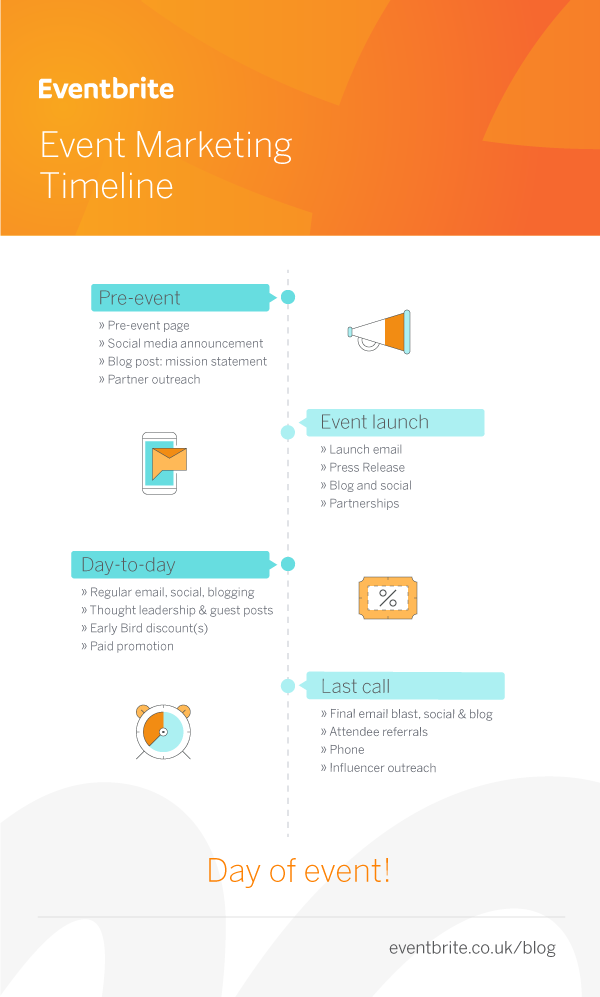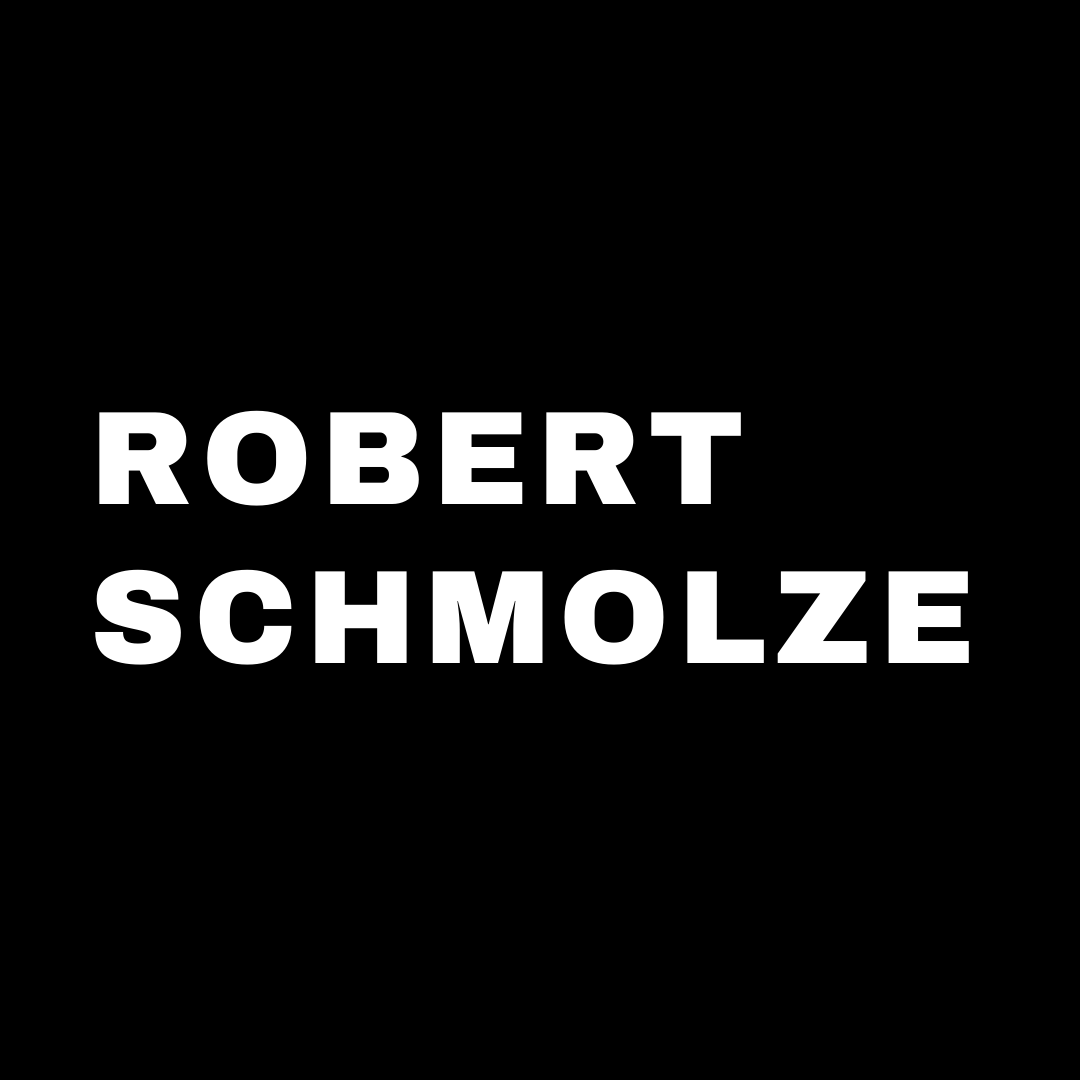by event bright
If you’ve ever run events, you’ll know that no matter how amazing they are in concept, they very rarely just ‘sell themselves’ (annoying, right?). In order to sell tickets, you need to be armed with an event marketing strategy that effectively promotes your event to your target audience.
But how do you go about creating one? In this guide we’re going to discuss what event marketing is, strategies you can use to create an event marketing timeline, with each promotion reinforcing the last, and how to ensure the right message is delivered at the right time, and to the right person.
What is event marketing?
Event marketing is defined by the tools, techniques and channels you use to promote an event to an audience, usually with the hope of getting them to buy tickets or attend.
Event marketing begins with launching an event idea, through to persuading attendees to invite their friends or colleagues and attracting a steady pipeline of leads through channels such as email marketing, blogging and advertising.
What is B2B event marketing?
B2B (business to business) event marketing is selling an event to other businesses in order to get them to attend, sponsor or exhibit. The channels of advertising may be the same (for example social media, email marketing, PPC) but the tone of voice and USPs may be different. For example at a consumer event, the sales techniques will be activated towards personal interest and benefit, whereas for a business event the rewards may need to be more tangible such as helping a business to increase revenue, generate leads or gain a competitive advantage.
How to create an event marketing strategy
While it’s impossible to present a perfect ‘catch-all’ event marketing plan – every event is different, as is every lead time, budget and target market – there are many common tactics and event marketing ideas that should help guide you when setting out your own event marketing calendar.
The image below shows how your event marketing strategy can be broken down into; pre-event, event launch, day-to-day marketing and “last call” (the final push before your event goes live!).

13 Tips on Building an Event marketing strategy
An event marketing strategy is all about raising awareness of your event. You want to direct potential attendees and previous attendees into the “awareness” stage of your marketing funnel, so that you can inform and advise them as they make the journey towards buying a ticket. For those who are already aware of your event, you’ll want to help move them towards the purchase and advocacy stages. Here are some of the areas you might consider adding to your event marketing strategy:
1. Early Bird discount(s)
Once you’ve gone past the initial launch excitement for your event, you’ll need to engineer more reasons to encourage people to register (and register now rather than later).
This where you can utilise the ‘early bird discount.’ Early bird discounts work by staggering your ticket sales to go up in price the closer to the event it gets. It’s not uncommon to have more than one of these.
The rest of your marketing activity should be geared towards building up interest and leads in the run-up to the expiry of your discounts, helping you create spikes of ticket sales.
2. Pre-event page
Too many people forget they can create an event page and make it live to capture early interest, even if all of the details aren’t yet finalised.
By creating a pre-event page, you can have a central page to drive people to, use it to capture early interest (all leads that can be contacted later) and it will help build up your SEO authority with Google.
3. Blogging
The next step in your event marketing strategy is to tell people why you’re organizing it. This is your mission statement. If you’re not sure why it’s important to have a mission statement or explain ‘why’ you are organising an event, take a few minutes to watch this video from Simon Sinek (you won’t regret it!)
You can use this to fuel the rest of your pre-event marketing and rally people around your idea and convince them of the need for your event. Blog posts are also less salesy than an event landing page, so are a great way to attract some initial interest.
4. Social media
Getting on social media early is important to creating momentum for your event promotion, building a community and spreading the mission that you’ve written about in your blog post (which you can link back to in your posts).
At this stage you should already have an event hashtag sorted (read this on how to create a good one) and be using it in your social posts.
Don’t forget the huge range and diversity of social media available to you now. Facebook, Twitter and LinkedIn will all remain important depending on what kind of event you run, but consider Instagram, Snapchat, Pinterest, YouTube, Tumblr, Medium, Reddit, Quora and others too. This post has some great ideas on using Snapchat as part of your event marketing, to share behind the scenes footage and to give coupons and increase user-generated content.
5. Partner outreach
Event marketing partnerships can be crucial to your event’s success, so you need to start reaching out to potential collaborators, complementary brands and media partners early, before your event has officially launched. This way they can help you spread the word from the very beginning. If you’re not sure how to approach them, check out our handy templates.
6. Thought leadership and guest posts
Blogging on your site is important, but you need to reach new audiences beyond it in order to find new attendees. The best way to do this is through guest posting or creating pieces of thought leadership that others will be happy to share.
Again, what the specifics of this look like will heavily depend on your event. For conferences and B2B events it’s relatively straightforward as you can create an industry report or offer a white paper that combines top tips from all your speakers.
For consumer events, it might be less obvious: You could create interesting infographics, gifs or other visual assets; write about ‘what’s hot’ and breaking trends; or produce a series of YouTube videos, or podcasts, that capture their attention.
7. Paid promotion
Whether it’s paid social media advertising, Google Adwords or retargeting, now’s the time to put cash behind your campaign if you’re going to do it at all. (For getting the most out of your paid digital marketing, check out eventbight’s guide).
With any of these options you can turn them on and off at will, so you could concentrate your spend just a couple of weeks or so before each early bird offer, or your event launch, helping to reinforce and amplify all your other marketing activities to enjoy maximum reach and impact.
8. Email
In the event industry Pulse Report, email was voted the single most effective tactic by event organisers, so it will no doubt be central to your campaign and ticket sales too.
With your event now ready for prime time you should get your first major email blast out to your potential attendees, including those who pre-registered.
9. Event press release
Gaining press coverage can help to amplify your event beyond your own network and can increase ticket sales and the number of people attending the event. It will also help to build your future brand strategy and increase links to your website, and potentially traffic for future events too.
Here are a few tips on writing a good press release:
- Copy the press release into the body of your email – traditionally press releases were sent as email attachments, but journalists today prefer to be able to read the release as part of the email. This saves them time and will increase your story’s visibility.
- Add an introduction line – personalize the introduction for every journalist and their publication. This will make them more likely to scroll down and read your press release.
- List the basic details of your event – keep things simple to help the journalist pluck out the key information easily.
- Come up with a compelling hook – Find your unique story angle. Running an event is simply not enough. For example, why is your event new, exciting, a first or a novelty? Who is attending – anyone famous? Do you have an interesting backstory of why this event or audience?
10. Final email blast, social & blog
Whether you’ve been marketing for a matter of months or weeks, your event will eventually loom large in front of you, and with just a couple of weeks (or even just a couple of days) to go, it’s time for your last-push marketing.
This will probably be in the form of another volley of blogs, social media updates and email blasts.
If there is any networking involved, then it’s a great idea to utilize the concept of ‘social proof’ at this stage and show the world who is already going to be at the event, which will help convince others they should be there too.
Your final blog posts, social media updates and emails should now take on a more urgent, sales-focused message as you’ve spent the past few weeks or months building up a relationship – now is the time to be super clear with your direct calls to action and convert that long-term strategy into ticket sales.
11. Attendee referrals
This is a frequently missed opportunity. Many organizers focus solely on bringing in new attendees, forgetting that they have a strong network of potential advocates they can already tap into.
Why not reach out to your existing attendees and incentive’s them to promote the event on your behalf? Word of mouth is consistently shown to be one of the most powerful and effective marketing tactics you can utilise. You could even offer them referral fees if they become an affiliate.
12. Influencer outreach
If you’re looking to fill a few last-minute places or get word out in an impactful way, then influencers could be your best shot. While it may be advisable to contact them at the start of your campaign, there’s a good chance they’ll be busy and so won’t have committed. Even if they did, by now they might have forgotten about it.
Now’s the time to re-engage with them and, if they are free, they’ll no doubt appreciate the invitation and repay your generosity by telling their network about the event.
13. Phone
Employing telesales teams is expensive, and only effective if you’ve got a great inbound marketing programme to support them with lots of fresh, warm leads.
However, that doesn’t stop you from picking up the phone yourself!
If you’ve noticed that a few of your targeted attendees, or some of those pre-registered leads, have still not bought a ticket, why not give them a call?
Ask if there’s anything you can help with? Do they have any questions? It doesn’t have to be a hard sell, but it’s much harder to ignore a phone call than an email or one of a thousand tweets on their timeline.
You’ll probably find it’s a relatively time-intensive but effective way of securing a few more sales if they’re needed.
Conclusion
If you take the suggestions above as a roadmap to help shape your event marketing strategy, you will be in a much stronger position to build momentum and ultimately achieve more ticket sales.



